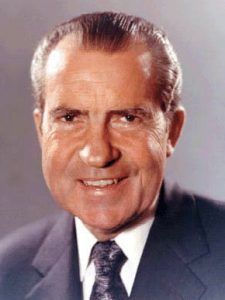
Home - Search - Browse - Alphabetic Index: 0- 1- 2- 3- 4- 5- 6- 7- 8- 9
A- B- C- D- E- F- G- H- I- J- K- L- M- N- O- P- Q- R- S- T- U- V- W- X- Y- Z
Nixon, Richard M
 Nixon Credit: NASA |
Born: 1913. Died: 1994-01-01. Birth Place: Whittier, California.
Richard M. Nixon was president of the United States between January 1969 and August 1974. Early in his presidency, Nixon appointed a Space Task Group under the direction of Vice President Spiro T. Agnew to assess the future of spaceflight in the nation. Its report recommended a vigorous post-Apollo exploration program culminating in a human expedition to Mars. Nixon did not approve this plan, but did decide in favor of building one element of it, the Space Shuttle, which was approved on January 5, 1972.
Country: USA. Bibliography: 535, 5837.
1969 March 5 - .
- Nomination of Acting Administrator Thomas O Paine to be the NASA Administrator - . Nation: USA. Related Persons: Nixon, Paine. Program: Apollo. President Nixon, at a White House ceremony, announced the nomination of Acting Administrator Thomas O. Paine to be the NASA Administrator..
1970 March 7 - .
- President Nixon listed six specific objectives for the space program - .
Nation: USA.
Related Persons: Nixon.
Program: Apollo.
In a White House release, President Nixon listed six specific objectives for the space program: continued exploration of the moon, exploration of the planets and the universe, substantial reductions in the cost of space operations, extension of man's capability to live and work in space, rapid expansion of the practical applications of space technology, and greater international cooperation in space.
1971 April 27 - . LV Family: Shuttle. Launch Vehicle: Space Shuttle.
- James C Fletcher sworn in as NASA Administrator - .
Nation: USA.
Related Persons: Fletcher,
Low, George,
Nixon,
Paine.
Program: Apollo.
James C. Fletcher was sworn in as NASA Administrator at a White House ceremony. Fletcher decided to push for Congressional approval of the stalled space shuttle program, but found that would only be forthcoming if the US Air Force agreed to participate. In order for that to happen, NASA would have to incorporate the USAF requirements for the shuttle that it had so far ignored (greater payload, higher cross-range). In another attempt to share the cost of the shuttle with other nations, previous NASA Administrator Thomas Paine had already tried to obtain international partners. But the only remnants of that effort were the Canadian robotic arm for the shuttle, and the European Space Agency Spacelab module. Neither represented a significant amount of the total program cost.
President Nixon had nominated Fletcher for the position on March 1, and the Senate had confirmed the nomination on March 11. George M. Low, NASA Deputy Administrator, had been Acting Administrator since the resignation of Paine on September 15, 1970.
1972 January 5 - . LV Family: Shuttle.
- Nixon announces $5.5 billion space shuttle program - . Related Persons: , Nixon. President Richard M. Nixon announced that NASA would manage a $5.5 billion program to develop a space shuttle to be the workhorse of future U.S. space efforts and replace all present launch vehicles..
1974 July 13 - .
- Nixon proclaimed July 16-24 United States Space Week on the fifth anniversary of Apollo 11 - .
Nation: USA.
Related Persons: Nixon.
Program: Apollo.
Flight: Apollo 11.
In recognition of the fifth anniversary of the Apollo 11 flight, which landed the first men on the moon, President Nixon proclaimed the period July 16 through July 24 as United States Space Week, stating: "The knowledge to be gained from space will lead to scientific, technological, medical and industrial advances which cannot be fully perceived today. Additional Details: here....
1994 January 1 - .
- Death of Richard M Nixon. - . Related Persons: Nixon. American politician, President of the US 1969-1974; allowed the Apollo and Skylab programs to complete, but denied NASA funds for its enormous post-Apollo program. He set budget limitations resulting in a partially-reusable shuttle design..
Back to top of page
Home - Search - Browse - Alphabetic Index: 0- 1- 2- 3- 4- 5- 6- 7- 8- 9
A- B- C- D- E- F- G- H- I- J- K- L- M- N- O- P- Q- R- S- T- U- V- W- X- Y- Z
© 1997-2019 Mark Wade - Contact
© / Conditions for Use